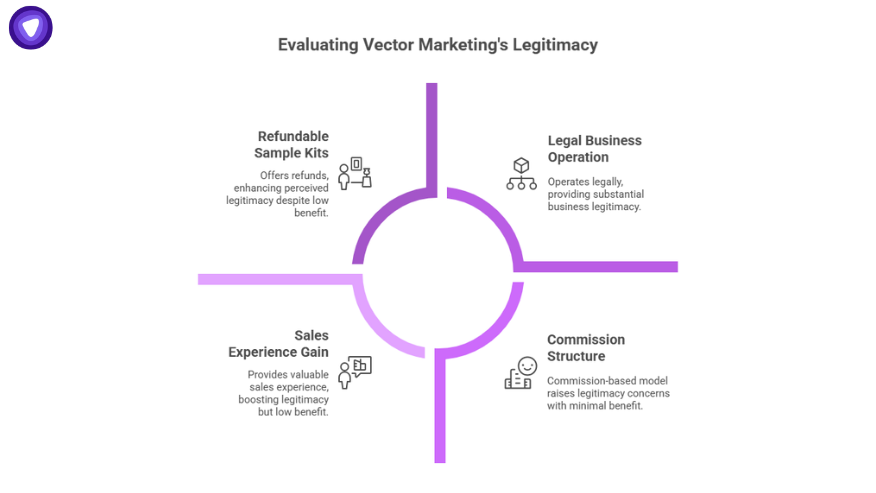Vector Marketing has been around for decades, yet the debate never stops. Type “vector marketing scam” into Google and you’ll see endless threads, reviews, and complaints. Some call it a classic opportunity to gain sales experience, while others warn it’s a waste of time or even a scam.
If you’re an entrepreneur, job seeker, or student considering joining, this guide breaks down the facts, without hype. We’ll cover what Vector Marketing is, why people call it a scam, what’s true and what’s not, and how it compares to legitimate reseller models for building a business.
- Is Vector Marketing a scam? No—it’s a legal direct sales company, but its aggressive recruitment and commission-only pay create controversy.
- What do they sell? Mostly Cutco knives through in-person or virtual demos.
- Why the bad reputation? Low earnings for most reps, misleading job ads, and high turnover rates.
- Is it worth joining? Only if you want short-term sales experience and can handle commission-based pay.
- Better alternatives: Digital reseller models (like VPN reselling) offer scalable, online income without door-to-door sales or recruitment pressure.
What Is Vector Marketing?
Vector Marketing is a direct sales company best known for selling Cutco knives. It has been recruiting sales reps, mostly students and part-timers, for decades. The model is straightforward: recruit independent representatives to sell knives directly to customers through home demos or virtual appointments.
This raises a common question: what does Vector Marketing sell? The answer is mainly kitchen cutlery and accessories. Despite criticism, the products are real and used in homes across the U.S.
So why do so many people type “is vector marketing a scam” or “vector marketing scams” into search engines? Much of it comes from its recruitment style, the pay structure, and the experience of past reps.
Why People Call Vector Marketing a Scam?
The company isn’t legally a pyramid scheme, but several practices have fueled controversy:
1. Aggressive Recruitment Tactics
Vector often recruits high school and college students using job ads that sound like standard office positions. Many only find out during orientation that they’ll be selling knives door-to-door or to personal contacts.
2. Commission-Based Pay
While there’s technically a base pay per appointment, it’s low and heavily tied to making sales. For someone expecting a stable hourly wage, this feels misleading. This is why you’ll find endless vector marketing scam reviews online.
3. High Turnover
Many recruits quit after a few weeks. Critics argue this shows the opportunity isn’t sustainable for most people.
4. Training and Expenses
Some reports claim that while the sample kit is refundable, recruits initially pay for it upfront. Travel costs and unpaid prep time add to frustration.
5. Complaints and Negative Press
A simple search for vector marketing reviews complaints shows a history of unhappy experiences. Sites like Vector marketing scam Reddit threads include hundreds of former reps describing poor pay and feeling “tricked.”
Evidence Against the Scam Claims

Despite criticism, calling Vector Marketing an outright scam isn’t accurate. Here’s why:
- Legal Business: The company sells actual products and has been operating for decades without being shut down by regulators.
- Refundable Sample Kits: Unlike illegal schemes, reps can return sample kits for refunds.
- Sales Experience: Many former reps report gaining confidence and sales skills even if they didn’t earn much money.
- Commission Structure: It’s a legitimate sales model similar to other commission-based roles.
This nuance often gets lost when you see “vector marketing is a scam” or “vector marketing scam or legit” headlines online. It’s not illegal but it’s not a guaranteed paycheck either.
Lawsuits and Regulatory Actions
Vector Marketing has faced lawsuits over unpaid wages and deceptive recruiting. For example:
- Past lawsuits alleged the company misclassified employees as contractors to avoid paying minimum wage.
- Settlements were reached, leading to policy adjustments, but negative press remains.
Searches like vector marketing corporation scam and vector marketing scam 2025 usually refer to these legal disputes or newer allegations of misleading job ads.
How Vector Marketing Makes Money?
Vector makes money primarily through:
- Direct Sales: Reps sell knives to customers and receive commissions.
- Sample Kits: Although refundable, these kits briefly bring in cash for the company.
- Upsells and Repeat Business: Customers who like Cutco products often purchase more, adding to revenue.
The Experience of Working at Vector Marketing
Not every experience is negative. Some reps thrive, making solid commissions and building useful skills. Positive vector marketing work from home reviews mention flexibility and supportive managers.
However, for every success story, there are multiple posts about long hours and little pay. Vector marketing jobs appeal mostly to students looking for temporary income rather than long-term careers.
Comparing Vector Marketing to Other Reseller Models
Entrepreneurs often ask: if Vector feels like a dead-end, what’s better?
- Start-up cost: $100–$500
- Scalability: Limited to in-person sales
- Recurring revenue: Low, mostly one-off sales
- Sales method: Door-to-door demos
- Start-up cost: $0–$200
- Scalability: High with global online reach
- Recurring revenue: Strong, subscription-based
- Sales method: Digital marketing & online sales
Reselling software or digital services provides a safer, scalable path. For example, a Vector marketing B2B setup is limited because reps sell physical knives locally. Compare that to a digital model like a VPN reseller program:
- No door-to-door selling.
- Recurring subscription revenue.
- Fully online operations with global reach.
- Optional white-labeling (your own brand).
Unlike Vector, this model doesn’t require cold calls or home visits. It’s closer to running a digital agency than selling kitchenware to friends and family.
Pros and Cons of Vector Marketing
| Pros | Cons |
| Established legal company | Aggressive recruitment tactics |
| Flexible work-from-home option | Low, inconsistent earnings |
| Refundable sample kit | High turnover |
| Sales experience for beginners | Complaints about misleading job ads |
This table sums up why the debate continues. Some see it as a stepping stone into sales; others see it as a waste of time.
A Smarter Path for Entrepreneurs: Digital Reselling
If you’re exploring opportunities to start a business or earn income, Vector isn’t the only option. Digital services like VPN reselling offer a cleaner, more scalable model:
- Buy VPN accounts in bulk at wholesale rates.
- Set your own prices and profit margins.
- White-label options let you build your own branded security product.
- Entirely online—no need for home demos or phone scripts.
Unlike Vector, you aren’t tied to a single product or forced into recruiting friends and family. With tools like PureVPN’s reseller program, you own your growth and revenue without the negative reputation associated with MLM-style sales.
Final Thoughts: Should You Join Vector Marketing?
Vector Marketing is not a scam in the legal sense, but it’s also not a guaranteed opportunity. The model works for a few people who are natural salespeople and comfortable with commission-only pay. For most, the effort outweighs the earnings.
Entrepreneurs looking for genuine ways to build a business might find digital reselling or white-label SaaS models more rewarding. If you want recurring income and a scalable business with your own branding, consider PureVPN’s reseller and white-label solutions instead.


